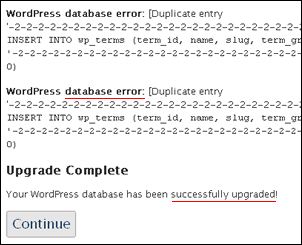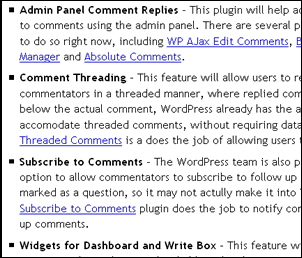 We’d been faithful and steadfast to WordPress for a very long time. Over the years, the increasing numbers of people that asked for recommendation for a blogging tool, we’d enthusiastically promote WordPress as the tool of choice.
We’d been faithful and steadfast to WordPress for a very long time. Over the years, the increasing numbers of people that asked for recommendation for a blogging tool, we’d enthusiastically promote WordPress as the tool of choice.
We’ve held the WordPress faith until we upgraded Isle of Wight News site, VentnorBlog, a sister site of Digital-Lifestyles, to version 2.6.
It was a total disaster. Two major problems struck for us.
Loss of data
There’s nothing more important to any system than the integrity of the data in it. How the data is displayed, improvements to editing methods, etc are all secondary to keeping the data safe.
All of the hard work that has gone into creation of the data must never be compromised.
Version 2.5 onwards uses a different database structure to the previous version we were running. This meant that the upgrade process altered the structure of the database tables.
While this automated process was carried out, errors were reported, but then a successful install reported, so the changes weren’t backed out of.
The result of this only came to light later a loss of about a third of our category information for the posts. Shocking.
Having realised what had happened, a search of the Internet found that we weren’t alone. Lots of other had lost data too. Many of the pages we found were on the WordPress forums, so WordPress were aware of this serious issue.
We’d have thought that they’d have gone all out in tell people that they data might be lost. At the most extreme, suspending the availability of v2.6 until this most vital of error was fixed.
WordPress just kept quiet.
We couldn’t square the open-source ethos that WordPress eulogised, with their knowledge that data was being corrupted.
This resulted in a significant loss of trust in WordPress for us.
As the data structures had changed, we were also unable to return to the previously working version of WordPress.
Given there’s version control built into the WordPress development process, we fail to understand how this major, major error could happen.
 Performance
Performance
Since we upgraded we’ve had major problems with the performance of our server. It’s _possible_ that it could have just happened at the same time. Traffic is continually increasing, but there hasn’t been a significant jump that might explain the performance drop.
Matt at WordPress claimed when version 2.5 was released that there had been database speed improvements, but we find that when we publish a story on VentnorBlog, we are forced to wait 30-50 seconds.
Post upgrade the performance of our server has been terrible, with timeouts from the server when publishing or editing a published story
Sadly the slowdown isn’t limited to just the backend. Now the public facing pages are slower too.
All round a big disappointment.
Repercussions – change of platform?
The loss of trust we’ve experienced in WordPress has brought us to a conclusion that, pre-version 2.6 we’d never considered. Changing platform.
We’re sure that we’re not unique in actually now considering moving to another blogging platform because of our horrible experience.
Of course, WordPress being an open source project, we could just shut up and get on with contributing to the code to make the changes to fix the problems – the reality is that I just don’t have the time to do that sort of thing any more.
We need to be able to reply on your publishing platform, because our focus is researching and writing article to publish.
The two platforms currently in our sights are Drupal and Joomla. We’ll keep you up to date with our findings.
WordPress 2.7 is currently waiting in the wings, which might improve things, but now we’ve questioned our trust in WP, it might be too late.
Comments
4 responses to “WordPress 2.6 Killed Our Love Of WordPress”
Feel your pain on the (failed) upgrade path, BUT to say that WordPress doesn’t advise on backing up data is wrong; its their first warning:
“Just in case something goes wrong, make sure you have a backup. WordPress Backups is a comprehensive guide.”
on the substantial Upgrade section of their website. It is also good form to back-up your own data on a regular basis, as a matter of course.
I have also found WP to be a cracking bit of software, and will immediately place it at the top of my list when considering any web page or site for development. I think you may find even more issues with Joomla or Drupal…
Sharing pain – thanks for that – wondering if that halves is … like a problem shared :)
Not sure how you read in the piece and thought that I said that they didn’t suggest backing up?
What I did say that once the upgrade failed, it didn’t give me a chance to back out of the changes that it had made. Backing out, ie undoing the changes to the database is a common feature when an upgrade fails.
Natch I had a backup of the data.
[…] WordPress 2.6 Killed Our Love Of WordPress – Digital LifestylesWe d been faithful and steadfast to WordPress for a very long time. Over the years, the increasing numbers of people that asked for recommendation for a blogging tool, we d enthusiastically promote WordPress as the tool of choice. We ve held […]
If i died or went sumwhere far i’d write ur name on every star so everyone could look up n see u mean the world 2 me.